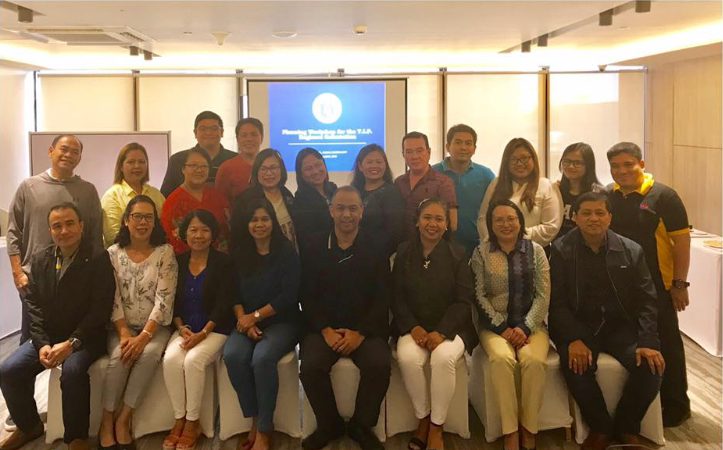
TIP is institutionalized to provide a systematic and comprehensive support system for the newly hired teachers in order to seamlessly immerse them in the teaching profession in the public school system. This program is anchored in the Philippine Professional Standards for Teachers, K to 12 Basic Education Program, and the TEC Law (also known as Republic Act 7784).
Day 1 started with the discussion of Dir. Manguerra on the assessment of the implementation of TIP for Year 1 starting from the monitoring report – having the strength and weakness of the implementation together with the findings and recommendations.
It was stated that during the actual monitoring and evaluation of TIP all regions complied and conducted the regional orientation except for Mimaropa and CAR. Having TIP in the field helped the newly hired teachers a lot and served as guide and gave value to teaching. The newly hired teachers became aware of their duties, responsibilities, and privileges. After the conduct of regional orientation, regions were asked to submit reports regarding the activity but unfortunately, there were regions that submitted incomplete reports, lacking a summary of participants, attendance sheet, distribution kit, and financial report. There were suggestions for the conduct of the orientation – to include fun activities, limit the talk sessions, and give more time on open forum, include also real scenarios and how to face it on the part of the newly hired teacher.
It was also found out that among 10 regions, only 1 conducted orientation with the division focal person and with the school heads. There are also divisions that conducted a 3-day orientation of all the TIP modules while some conducted 3-day orientation per module. There were 5 districts provided with technical assistance because they are not aware of the TIP. They also suggest various modalities to be considered in the implementation.
There were recommendations for teachers and for the policy. That TIP should be given enough time because 3 days is not enough, mentoring should be done by seasoned teachers, and that there is a need for an in-depth discussion of the module and specific details of the TIP implementation must be provided. For the policy, all regions should conduct an orientation on TIP implementation with the division focal persons, district supervisors, and school heads, that TIP is a school-based program and schools must have an implementation plan. The policy should come up with different modalities of implementation and consider the typology of school.
Dr. Myrna Libutaque facilitated the sharing of best practices during the regional orientation on the issues and concerns that arise.
Luzon participants shared their best practices during the regional orientation: planning with the technical working group, assign master teachers as rotating mentors for module 1, 2, and 3, the participation of partnership for the free venue and food, full support of RD, SDS, TWG, and SDOs, invited resource speakers from different agencies like GSIS, CSC and Metrobank awardees to give an inspirational talk, uploaded the different modules on the web for easy access, school heads are also oriented on the policy. Some issues and concern raised was some participants were not truly newly hired teachers, some are late and inactive due to long travel from their station to the venue, the venue is too far, the crowd was too big, some teachers were shy and intimidated, some teachers coming from the islands didn’t make it to the kickoff and a very weak M & E.
Visayas participants, on the other hand, stated that same with the Luzon cluster they also have TWG consisting of HRDD and SGOD personnel who were assigned in preparing for the materials, attendance, registration, and during the distribution of certificates – they were headed by their HRDD chief. They also invited speakers coming from different agencies and were given simple tokens courtesy of SGOD chiefs. The regional office found a way to produce 450 copies of TIP modules and was given to different divisions. Also in identifying the number of participants, equity was considered where the larger the location the bigger number of teachers allotted. Some issues and concerns like the late arrival of participants due to the distance and location of the station to the venue and go home as early as 3 pm to avoid getting home too late.
For the Mindanao cluster’s best practices includes the presence of all the important personalities like RD, ARD, SGOD chiefs, and key personalities from SDO to boost and inspired the newly hired teachers, the host division provide an overnight stay for the participants so that no one will be late in the program, LED wall was used to aid the ease of presentation and to get the attention of the participants. Some concerns and issues raised like the presence of political figures which brought good news to the newly hired teachers to inspired them, limited slots for the teachers, limited budget for the equipment and technology, and a very weak M & E.
The 2nd day was the announcement of the breakdown of the budget to be downloaded including the amount to be downloaded by the TECs Administrative Officer, Ms. Roma Balbuena. She also mentioned that SARO was already released. Then, the participants had a grouping /discussion on how to deliver and execute the 1-day regional orientation. The purpose of this is to have a uniform flow of program during the orientation.
At the end of the 2-day workshop, the participants hand in with them the softcopy of the flow of the program as well as the budgeted amount for the regional orientation. Dir. Manguerra’s ways forward for the participants: 1) there will be a discussion about proposed programs, 2) craft the criteria in choosing the best TIP implementer, 3) strengthen TIP monitoring.

